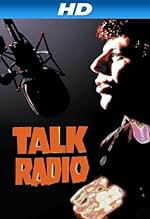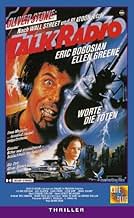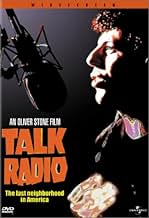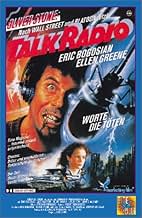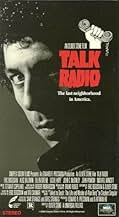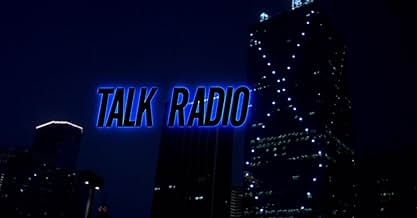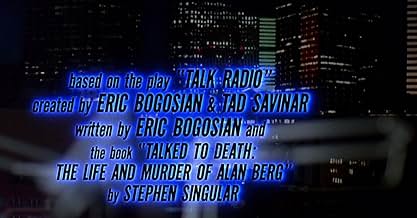PUNTUACIÓN EN IMDb
7,2/10
15 mil
TU PUNTUACIÓN
Un presentador maleducado y despectivo se ve abrumado por el odio que rodea a su programa justo antes de que se emita a nivel nacional.Un presentador maleducado y despectivo se ve abrumado por el odio que rodea a su programa justo antes de que se emita a nivel nacional.Un presentador maleducado y despectivo se ve abrumado por el odio que rodea a su programa justo antes de que se emita a nivel nacional.
- Premios
- 3 premios y 5 nominaciones en total
Anna Thomson
- Woman at Basketball Game
- (as Anna Levine)
- …
Argumento
¿Sabías que...?
- CuriosidadesEric Bogosian's play "Talk Radio", on which this film is based, was a finalist for the Pulitzer Prize.
- PifiasWhen Barry Champlain says that he's going to punish his listeners by playing the Bee Gees' song - Saturday Night Fever, ten times in a row. While they had a monster hit with "Night Fever" there is no such song as "Saturday Night Fever." The record they actually play is Disco Inferno by The Tramps. This may be intentional due to copyright issues; however, the track is on the OST for Saturday Night Fever.
Reseña destacada
In one of the more under-seen films of the late 1980's, at a time when Oliver Stone was riding high with Platoon and Wall Street (and before his opus Born on the Fourth of July), he co-scripted and directed this look at the world of radio, specifically one radio host in the middle of Texas. This man is Barry Champlain, in a once-in-a-career turn from Eric Bogosian, who wrote the original play and also co-wrote the script. Barry is like a mix of Howard Stern and one of those pundits you hear on the radio stations many of us might turn off. He's got ideas on his mind, opinions, and he's not only un-afraid to speak them, but also to stand up against the phone callers. The callers, indeed, are the driving force in the film, as Barry has to combat against the mindless, the obscene, the racist, and the purely absent-minded. As this goes on, he also has to contend with his boss (Alec Baldwin) and a hit or miss deal to go nationwide, outside the confines of the Southern way station he's in.
While after seeing the film I felt curious as to see how it would've been done on stage (I'd imagine it was a one-man show, as Bogosian has had several on the side), the direction of the film is phenomenal. Stone has been known, almost typecast, as a director who loves quick cuts, the limitless effects of montage, and effects with the styles of camera-work and other little tricks, that give his films in the 90's a distinctive, almost auteur look. But in the 80's he had this energy and feverish quality to the look of the film, and wasn't as frenzied as the other films. In order to add the proper intensity that is within the studio and head-space of Barry Champlain, he and DP Robert Richardson make the space seem claustrophobic at times, gritty, un-sure, and definitely on edge. The scenes in the middle of the film, when Barry isn't in the studio, are fairly standard, but the style along with the substance in the radio scenes is among the best I've seen from the Stone/Richardson combination.
And one cannot miscalculate the performance of Bogosian, who can be obnoxious, offensive, angered, passive, and everything that we love and hate in radio show hosts. There is also a funny, near distracting supporting role for Michael Wincott as Kent/Michael/Joe, who prank calls him one night, and the next gets invited to the studio. These scenes are a little uncomfortable for a viewer, but it does get very much into the subculture head-space of the 80's that Barry is as intrigued as he is critical of. The stoner may not 'get it', but as he says to him "it's your show". Indeed, it's hard to cover everything that goes on within the talk, and there is a lot of it. But it's never boring, and like Champlain himself, it's not easy to ignore. And when Bogosian goes into his climactic tirade on air, with the background panning around in a continuous 360 spin, it becomes intoxicating, and a reason why freedom of speech is so powerful.
Stone has been synonymous as a filmmaker of hot-button issues, who takes on subjects that were or still are controversial, and gives them a life-force that isn't always great, but is all his own. Here his skills and ambitions don't get in the way of Bogosian's- it's boosted, if anything, making an extremely skilled vision of what is essentially a near one-man show, which in and of itself is already well-written.
While after seeing the film I felt curious as to see how it would've been done on stage (I'd imagine it was a one-man show, as Bogosian has had several on the side), the direction of the film is phenomenal. Stone has been known, almost typecast, as a director who loves quick cuts, the limitless effects of montage, and effects with the styles of camera-work and other little tricks, that give his films in the 90's a distinctive, almost auteur look. But in the 80's he had this energy and feverish quality to the look of the film, and wasn't as frenzied as the other films. In order to add the proper intensity that is within the studio and head-space of Barry Champlain, he and DP Robert Richardson make the space seem claustrophobic at times, gritty, un-sure, and definitely on edge. The scenes in the middle of the film, when Barry isn't in the studio, are fairly standard, but the style along with the substance in the radio scenes is among the best I've seen from the Stone/Richardson combination.
And one cannot miscalculate the performance of Bogosian, who can be obnoxious, offensive, angered, passive, and everything that we love and hate in radio show hosts. There is also a funny, near distracting supporting role for Michael Wincott as Kent/Michael/Joe, who prank calls him one night, and the next gets invited to the studio. These scenes are a little uncomfortable for a viewer, but it does get very much into the subculture head-space of the 80's that Barry is as intrigued as he is critical of. The stoner may not 'get it', but as he says to him "it's your show". Indeed, it's hard to cover everything that goes on within the talk, and there is a lot of it. But it's never boring, and like Champlain himself, it's not easy to ignore. And when Bogosian goes into his climactic tirade on air, with the background panning around in a continuous 360 spin, it becomes intoxicating, and a reason why freedom of speech is so powerful.
Stone has been synonymous as a filmmaker of hot-button issues, who takes on subjects that were or still are controversial, and gives them a life-force that isn't always great, but is all his own. Here his skills and ambitions don't get in the way of Bogosian's- it's boosted, if anything, making an extremely skilled vision of what is essentially a near one-man show, which in and of itself is already well-written.
- Quinoa1984
- 9 ago 2005
- Enlace permanente
Selecciones populares
Inicia sesión para calificar y añadir a tu lista para recibir recomendaciones personalizadas
- How long is Talk Radio?Con tecnología de Alexa
Detalles
Taquilla
- Presupuesto
- 4.000.000 US$ (estimación)
- Recaudación en Estados Unidos y Canadá
- 3.468.572 US$
- Fin de semana de estreno en EE. UU. y Canadá
- 80.547 US$
- 26 dic 1988
- Recaudación en todo el mundo
- 3.468.572 US$
- Duración1 hora 50 minutos
- Color
- Mezcla de sonido
- Relación de aspecto
- 1.85 : 1
Contribuir a esta página
Sugerir un cambio o añadir el contenido que falta

Principal laguna de datos
By what name was Hablando con la muerte (1988) officially released in India in English?
Responde

